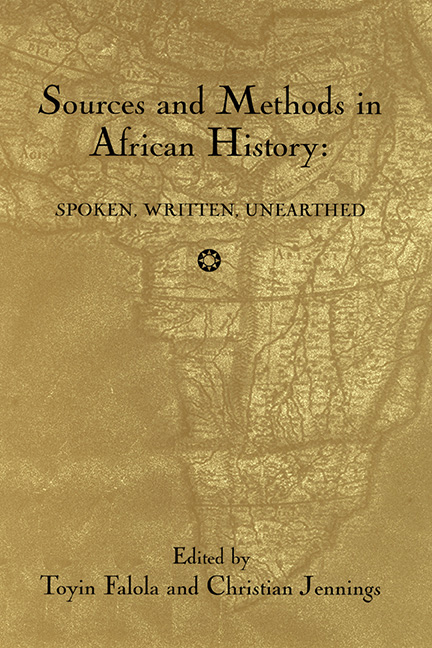Book contents
- Frontmatter
- Dedication
- Contents
- Acknowledgments
- Introduction
- Part I Archaeological Sources
- 1 Section Introduction: Archaeology and History
- 2 Trouble with Siblings: Archaeological and Historical Interpretation of the West African Past
- 3 Material Culture and Cadastral Data: Documenting the Cedarberg Frontier, South Africa, 1725–1740
- 4 Chronology, Material Culture, and Pathways to the Cultural History of Yoruba-Edo Region, 500 B.C.–A.D. 1800
- 5 For Trinkets Such As Beads: A Revalorization of Khoisan Labor in Colonial Southern Africa
- Part II Africa and the Atlantic World
- Part III Documentary Sources
- Part IV Oral Tradition
- Part V Innovative Sources and Methods
- Contributors
- Index
4 - Chronology, Material Culture, and Pathways to the Cultural History of Yoruba-Edo Region, 500 B.C.–A.D. 1800
from Part I - Archaeological Sources
Published online by Cambridge University Press: 25 October 2017
- Frontmatter
- Dedication
- Contents
- Acknowledgments
- Introduction
- Part I Archaeological Sources
- 1 Section Introduction: Archaeology and History
- 2 Trouble with Siblings: Archaeological and Historical Interpretation of the West African Past
- 3 Material Culture and Cadastral Data: Documenting the Cedarberg Frontier, South Africa, 1725–1740
- 4 Chronology, Material Culture, and Pathways to the Cultural History of Yoruba-Edo Region, 500 B.C.–A.D. 1800
- 5 For Trinkets Such As Beads: A Revalorization of Khoisan Labor in Colonial Southern Africa
- Part II Africa and the Atlantic World
- Part III Documentary Sources
- Part IV Oral Tradition
- Part V Innovative Sources and Methods
- Contributors
- Index
Summary
Introduction
The topics of origins and intergroup relations in Yoruba-Edo region have attracted the attention of historians, archaeologists, and linguists alike, but the long-term chronological and cultural historical scheme needed to understand the origins, changes, and continuities of the cultural institutions in the region has been lacking (see Figure 4.1). In fact, one can argue that the pre-nineteenth-century historiography of Yoruba-Edo region has been poor in research themes, in historical explanations of cultural innovations, and in long-term perspectives of structural change and continuity, partly because an historical periodization scheme that encompasses the region has yet to be defined. A major manifestation of this historiographical poverty is that the vision of the precolonial cultural history has been predominantly limited to the nineteenth century. This study brings the achievements of over fifty years of archaeological and historical research together for developing a long-term chronological scheme using archaeological data (chronometric dates and artifacts) and oral historical traditions. The historical themes that define the periodization and cultural-historical schemes focus on factors internal to Yoruba-Edo region and not on the episodes of external contacts. This study involves an integration of local and site-specific regional chronology, and the reworking of chronological schemes that were based on narrow or specific types of cultural behavior (e.g., artistic traditions) (see Table 4.1). Although background information is provided on the possibilities of much earlier human occupation in the region, the period covered in this study stretches from ca. 500 B.C. to A.D. 1800.
There are some justifications for this exercise. The general lack of long-term chronological and cultural historical frameworks for most regions of Africa especially for the vast period that is often referred to as “precolonial” or “Iron Age” has encouraged the wrong view of African cultural institutions as a fixed timeless past or a floating ethnographic present for which there is a status quo ante. This chapter demonstrates that traditions have history and that archaeology provides a pathway to the understanding of the long-term history of these traditions (read: cultures and structures). In other words, the goal is to demonstrate that inherited artifacts, technology, ideas, values, institutions, sociopolitical organizations, and social actions of Yoruba-Edo region are “historically produced as organized and organizing schemes of action that are meaningful to the individuals (and societies) involved,” just as historical experience is also culturally mediated.
- Type
- Chapter
- Information
- Sources and Methods in African HistorySpoken Written Unearthed, pp. 33 - 79Publisher: Boydell & BrewerPrint publication year: 2003



